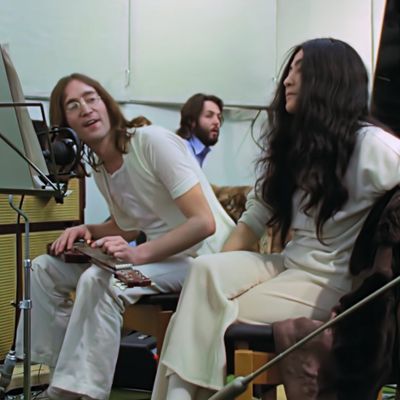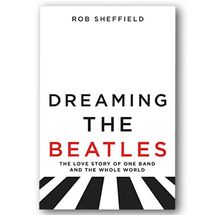
So you’ve watched all eightish hours of Get Back. Mazels to you on making the time for this unwieldy yet mesmerizing opus and for seeing it all the way through. Now that it’s over, you might be left thinking, What’s next? Today is your lucky day, friend. There is so much Beatles content out there — some of it quite recent! — for you to dig into.
Something for Everyone
Dreaming The Beatles: The Love Story of One Band and The Whole World is essential reading for anyone who’s so much as tapped their foot to “Love Me Do.” Rob Sheffield examines why, 50-plus years after they broke up, this particular band remains ubiquitous and beloved, a fandom handed down and renewed by boomers to Xers to millennials to zoomers. At the root of it all is a combination of their musical excellence and our emotional relationships with their songs. For depth of knowledge and degree of enthusiasm, there’s nothing better.
The Novice Fan
Bless your darling heart and practically virgin ears, are you in for some fun. Your starter pack begins with the lads’ first movie, A Hard Day’s Night. It’s an economical 87 minutes of fizzy, near-dizzying early-period Beatles delight. The story couldn’t be simpler: The greatest boy band of all time is trying to get through 24 hours and a live TV performance without being torn limb from limb (in a loving way, but still!) by their screaming fans. A Hard Day’s Night is both extremely of its time and timelessly stylish, thanks to how funny and dear the Beatles are, how fresh these songs from 1964 still sound, and how cool everyone looks in their sharp suits in black-and-white. It even rhymes narratively with Get Back, culminating in a live performance for adoring fans.
If you marvel at the enduring appeal of the songs in A Hard Day’s Night, give a listen to the episode of Slate’s Hit Parade where king of pop-history storytelling Chris Molanphy explains the chaotic soup of music, business, and social conditions that resulted in the Beatles’ unprecedented and unrepeatable sweep of Billboard’s top-five songs in 1964.
The “I’m Just Here for My Favorite Beatle” Viewer
John Lennon
The most restless, messy, and political Beatle is the one most difficult to reckon with. Being murdered at 40, just weeks before the release of your ambitious comeback album, while the rest of your world-conquering band goes on to enjoy several more decades of making music and burnishing their legacies, is a confounding variable here. Get a sense of the person he was growing into with the documentary The U.S. vs. John Lennon, all about how his criticism of the Vietnam War and attempts to mobilize young American voters in the 1972 presidential election nearly got him deported. John’s final interview, given to Rolling Stone three days before his death, shows us the man as an artist, husband, and father on the cusp of something new. We never got to hear its fullest flowering, but what we do have is pretty great.
Paul McCartney
Is there a more appealing, skilled, or insistent cultivator of cultural legacy than Sir Paul? His workaholic ways have brought us a smorgasbord of new content in the last two years alone. His lockdown project was to record and release McCartney III, the third in his decades-long series of albums in which he plays all the instruments. He gamely sits for interviews; he’s an insightful talking head in Mark Ronson’s recent Watch the Sound series on Apple TV+; and he just inducted the Foo Fighters into the Rock and Roll Hall of Fame. If you’re all about Paul, you’re probably also a process nerd who will thrill to the six-part Hulu series, McCartney 3, 2, 1, with sonic seeker Rick Rubin. It’s a treat to see Rubin, usually the picture of shaggy, avuncular calm, for once being the starstruck pupil as he and McCartney transform an enormous recording console into a campfire to gather around and revisit the writing and production of so many classic songs.
George Harrison
No appreciation of the most underrated Beatle is complete without this iconic tribute performance of “While My Guitar Gently Weeps” from his posthumous solo induction into the Rock and Roll Hall of Fame. There’s a particularly wonderful little moment here between Prince and George’s son Dhani Harrison. About 90 seconds into Prince’s blistering guitar solo, they lock eyes and share a wide grin (Dhani) and a sweet smile (Prince, of blessed memory). For a more in-depth exploration of George as a person and an artist, dig into Martin Scorsese’s HBO documentary George Harrison: Living in the Material World.
Ringo Starr
Put some respect on Richard Starkey’s name! Okay, sure, he’s neither a great singer nor much of a songwriter. To harp on those shortcomings is to misunderstand Ringo’s greatness, though. The quiet, earned confidence of his musicianship — a distinctive and immediately recognizable style — is integral to the Beatles’ sonic alchemy. As his peers highlight in this Rock and Roll Hall of Fame tribute, Ringo offers flourishes without flash. And please, never forget that it’s Ringo’s driving drum solo on “The End” (1969) that the Beastie Boys sampled on “The Sounds of Science” (1989) and his endlessly repeating, “falling groovily down the stairs while on LSD” fill on “Tomorrow Never Knows” (1966) that the Chemical Brothers copied and sped up on “Setting Sun” (1997).
Billy Preston
Let It Be wouldn’t be a classic without Preston’s seemingly effortless contributions on electric piano. His playing adds such depth and soul to every song, and as depicted in Get Back, he fits perfectly into the in-studio dynamic. Of course George rates Billy higher even than Ray Charles, and John wonders aloud about asking him to join the band — if that’s not a case for induction into the Rock and Roll Hall of Fame, what is? His performance of “That’s the Way God Planned It” at the Concert for Bangladesh moves from sway-along gospel to full-on praise jam, taking the enthusiastic crowd along for the ride of their lives. I can’t wait to see the forthcoming documentary about the Fifth Beatle, and I hope it does justice to his self-taught genius and life spent reconciling his art, abuse survival, and queer sexuality.
The Gossip Lover
If your only takeaway from Get Back is that Yoko Ono did not break up the Beatles, that’s a win. In the second episode, Paul himself says explicitly that he’s very happy for her and John, and he would understand if John chose this relationship over the band. Do Yoko a solid and debunk that hateful nonsense at every opportunity; if you need backup, Michael Hobbes and Sarah Marshall have got you covered with their Yoko-centric episode of You’re Wrong About.
The Avowed Beatlemaniac
Okay, you’ve probably already seen, heard, and/or read everything on this list. If that’s so, it’s equally probable that you’re a completist who will enjoy revisiting some of it, just to be reminded of why you love what you love.
Refresh your memories of the Fab Four at the height of early Beatlemania with Ron Howard’s Eight Days a Week: The Touring Years. Clocking in at just over an hour and a half, this documentary turns up the dial on the themes A Hard Day’s Night explores, showing the emotional, physical, and creative toll of touring nonstop and playing for crowds screaming so loud nobody can hear the music.
Why are we still listening to Sgt. Pepper’s Lonely Hearts Club Band? Is it the Where’s Waldo clutter of the cover photo? The sonic maximalism and experimentation? The opportunity to revisit the album as a cultural artifact of 1967 and response to the Beach Boys’ Pet Sounds? Jon Caramanica and Jon Pareles discuss all that and more in this wide-ranging episode of the New York Times Popcast, and conclude: yes.
Finally, Yesterday is a rom-com that posits an alternate timeline where the Beatles never existed for everyone but Jack, a floundering singer-songwriter who “writes” and records their songs. Predictably, his career takes off like a rocket, but his feelings about it all are decidedly mixed until he gets some advice from [REDACTED]. The premise is both high-concept and thin, but the actors’ performances are winning and buoyant, much like the songs they’re celebrating. It’s always been about the songs. It’ll always be about the songs, and the memories they give us, all longer than the road that stretches out ahead.
